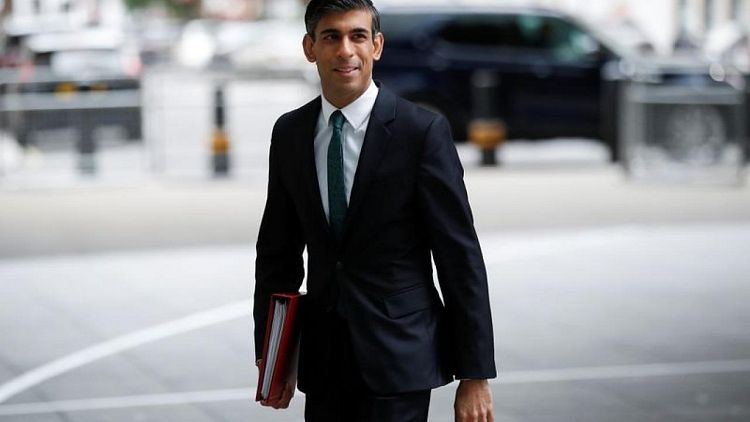By David Milliken, Andy Bruce and William Schomberg
LONDON -Finance minister Rishi Sunak promised higher public spending and new tax cuts as Britain's economy rebounded more strongly from the COVID-19 pandemic than previously expected, and he vowed to protect households from rising inflation.
Sunak used a half-yearly budget statement on Wednesday to announce multi-billion-pound investments to help Prime Minister Boris Johnson meet his spending promises to voters and ease a cost-of-living squeeze for low-earning households.
But the plan comes with a cost: Britain's official budget forecasters said the government's tax take was on course to be its biggest since the 1950s, thanks in large part to tax increases announced in March and September.
Those hikes meant Sunak has raised taxes by more this year than in any single year since 1993, after the Black Wednesday currency crisis, the Office for Budget Responsibility said.
Public spending is set for its largest sustained share of economic output since the late 1970s.
In a speech to parliament, Sunak hailed the improved economic growth forecasts as a vindication of the policies he rolled out to steer Britain through the pandemic.
The OBR said the economy was likely to grow by 6.5% in 2021, a lot faster than a forecast of 4.0% made in March when Britain was still in a coronavirus lockdown and just enough to balance out the slump of almost 10% in 2020.
"Today's budget does not draw a line under COVID. We have challenging months ahead." Sunak said. "But today's budget does begin the work of preparing for a new economy post-COVID."
The higher growth forecast for 2021 meant the economy was expected to regain its pre-pandemic size at the turn of this year, not in the second quarter of 2022 as predicted in March although that was still later than in other countries.
It also meant Sunak - who racked up Britain's biggest ever peacetime budget deficit to combat the coronavirus - would be able to borrow less than previously expected.
The OBR projected the deficit for the ongoing 2021/22 financial year would be equivalent to 7.9% of economic output - down from its previous forecast of 10.3% and almost half the size of last year's historic shortfall.
The OBR cut its forecasts for borrowing in each of the subsequent four financial years.
Sunak said every government department would get a real-term increase in spending and he promised the biggest increase in a decade in the core funding of local governments.
He announced new rules to govern borrowing: a commitment that underlying public sector net debt must be falling as share of GDP and the government's day-to-day spending must be balanced by revenues within three years.
On taxes, Sunak moved to lessen the hit for low-earning families from the recent end to a pandemic emergency top-up of their welfare benefits, and he also cut business rates for one year for hard-hit sectors such as retail and hospitality.
Drinkers would be spared a planned increase in duty on alcohol worth more than 600 million pounds a year.
"WILLING TO ACT" ON INFLATION
Sunak acknowledged the risks posed by rising inflation, much of which he blamed on problems in the global economy.
The OBR said it expected inflation to hit 5% next year.
"I understand people are concerned about global inflation – but they have a government here at home ready and willing to act," he said.
He announced further measures to ease a shortage of truck drivers which has led to supply chain problems.
"And in terms of our fiscal policy, we are going to meet our commitments on public services and capital investment but we are going to do so, keeping in mind the need to control inflation," Sunak said.
A big risk for Sunak is that the recent jump in inflation proves to be more stubborn than expected, which could push up the government's debt costs sharply.
Around a quarter of British gilts are indexed to inflation, a higher share than most other rich economies.
A 1-percentage-point rise in interest rates and inflation would cost taxpayers about 23 billion pounds a year, according to government estimates.
That would be equivalent to double the money that Sunak plans to raise with his increase in social security contributions to fund the health service and social care.
Borrowing costs could start to go up as soon as next week when the Bank of England is due to announce its November policy decision.
